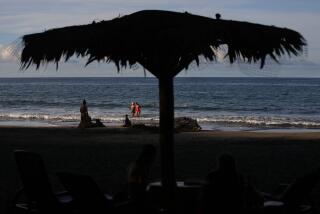Travelers beware: before booking, check a map
Question: My husband and I wanted to go to Punta Cana in the Dominican Republic, so we booked a place on the Internet. When we got to Punta Cana, we couldn’t find our resort. We did find signs pointing to Sunscape, which is where we booked, but it was about 40 minutes away, so we didn’t think that could be it. It was. Although it was fine, it wasn’t what we wanted. How can people make sure they’re getting the location they paid for?
--Antoinette Zanon, Westlake Village
Answer: You can’t -- at least if you rely only on a name.
Consider, for a moment, that none of the three big airports serving the nation’s capital is in Washington, although all three have “Washington” in their names. (Washington Dulles and Washington National are in Virginia; although Baltimore-Washington apparently is conflicted about lying, it most assuredly isn’t in D.C.)
So we arrive at Rule No. 1 of trip planning: If you want to know exactly where something is, look it up. This is why God invented maps (or their modern-day website-based brothers).
“Punta Cana is a very large area and includes many towns,” wrote James Berryman in an e-mail. Berryman is assistant to the general manager of Dreams Punta Cana and regional director of operations at AMResorts Dominican Republic.
This leads to Rule No. 2: Look at the address of your destination. Click on the “about us” button on Sunscape’s website (www.sunscaperesorts.com), and you’ll see the address says Playas Uvero Alto. When you look at a map, you can see the Punta Cana airport, you can see Playas Uvero Alto, and you can see that they’re not close.
And that leads to Rule No. 3: Do your homework.
“A second opinion is only a few keystrokes away,” said Cree Lawson, founder and chief executive of Travel Ad Network, a sales force for 50 travel websites.
You can turn to such sites (online or guidebooks) as Lonely Planet, Fodor’s or Frommer’s (for professionally generated content) or TripAdvisor or IgoUgo (for user-generated content) or many, many others.
Certainly, a brand’s website can be a good source of info -- “just because it’s marketing doesn’t mean it’s not real,” says Allan Miller, associate professor of travel and tourism marketing at Towson University in Maryland, but “if they’re shading their marketing, that’s wrong.”
You just have to be smart enough to know the difference. Which leads to the fourth and final rule: If all of this is too much, turn to a professional travel agent. Online is great, but there’s also something pretty terrific about talking to a real person who understands the landscape.
When it comes to spending a few thousand dollars on a vacation, it just might be that the best rule is that humans rule.
Have a travel dilemma? Write to travel@latimes.com.
More to Read
Sign up for The Wild
We’ll help you find the best places to hike, bike and run, as well as the perfect silent spots for meditation and yoga.
You may occasionally receive promotional content from the Los Angeles Times.







